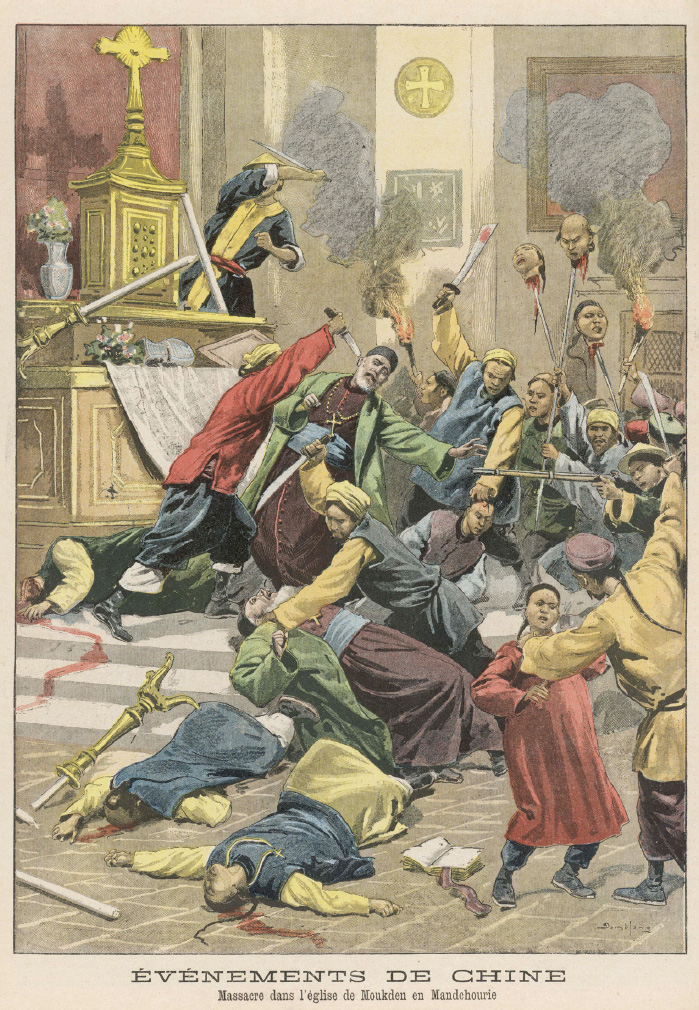A History of Western Society: Printed Page 817
A History of Western Society, Value Edition: Printed Page 825
Toward Revolution in China
In 1860 the two-hundred-year-old Qing Dynasty in China appeared on the verge of collapse. Efforts to repel foreigners had failed, and rebellion and chaos wracked the country. Yet the government drew on its traditional strengths and made a surprising comeback that lasted more than thirty years.
Two factors were crucial in this reversal. First, the traditional ruling groups temporarily produced new and effective leadership. Loyal scholar-statesmen and generals quelled disturbances such as the great Tai Ping rebellion. The remarkable empress dowager Tzu Hsi (tsoo shee) governed in the name of her young son, combining shrewd insight with vigorous action to revitalize the bureaucracy.
Second, destructive foreign aggression lessened, for the Europeans had obtained their primary goal of establishing commercial and diplomatic relations. Indeed, some Europeans contributed to the dynasty’s recovery. A talented Irishman effectively reorganized China’s customs office, increasing government tax receipts, and a sympathetic American diplomat represented China in foreign lands, helping to strengthen the Chinese government. Such efforts dovetailed with the dynasty’s efforts to adopt some aspects of Western government and technology while maintaining traditional Chinese values and beliefs.

The parallel movement toward domestic reform and limited cooperation with the West collapsed under the blows of Japanese imperialism. The Sino-Japanese War of 1894 to 1895 and the subsequent harsh peace treaty revealed China’s helplessness in the face of aggression, triggering a rush by foreign powers for concessions and protectorates. At the high point of this rush in 1898, it appeared that the European powers might actually divide China among themselves, as they had recently divided Africa. Probably only the jealousy each nation felt toward its imperialist competitors saved China from partition. In any event, the tempo of foreign encroachment greatly accelerated after 1894.
China’s precarious position after the war with Japan led to a renewed drive for fundamental reforms. Like the leaders of the Meiji Restoration, some modernizers saw salvation in Western institutions. In 1898 they convinced the young emperor to launch a desperate hundred days of reform in an attempt to meet the foreign challenge. More radical reformers, such as the revolutionary Sun Yatsen (1866–1925), who came from the peasantry and was educated in Hawaii by Christian missionaries, sought to overthrow the dynasty altogether and establish a republic.
The efforts at radical reform by the young emperor and his allies threatened the Qing establishment and the empress dowager Tzu Hsi, who had dominated the court for a quarter of a century. In a palace coup, she and her supporters imprisoned the emperor, rejected the reform movement, and put reactionary officials in charge. Hope for reform from above was crushed.
A violent antiforeign reaction swept the country, encouraged by the Qing court and led by a secret society that foreigners called the Boxers. The conservative, patriotic Boxers blamed China’s ills on foreigners, charging foreign missionaries with undermining Chinese reverence for their ancestors and thereby threatening the Chinese family and the society as a whole. In the agony of defeat and unwanted reforms, the Boxers and other secret societies struck out at their enemies. In northeastern China, more than two hundred foreign missionaries and several thousand Chinese Christians were killed, prompting threats and demands from Western governments. The empress dowager answered by declaring war, hoping that the Boxers might relieve the foreign pressure on the government.
The imperialist response was swift and harsh. After the Boxers besieged the embassy quarter in Beijing, foreign governments organized an international force of twenty thousand soldiers to rescue their diplomats and punish China. Western armies defeated the Boxers and occupied and plundered Beijing. In 1901 China was forced to accept a long list of penalties, including a heavy financial indemnity payable over forty years.
The years after this heavy defeat were ever more troubled. Anarchy and foreign influence spread as the power and prestige of the Qing Dynasty declined still further. Antiforeign, antigovernment revolutionary groups agitated and plotted. Finally, in 1912 a spontaneous uprising toppled the Qing Dynasty. After thousands of years of emperors, a loose coalition of revolutionaries proclaimed a Western-style republic and called for an elected parliament. The transformation of China under the impact of expanding Western society entered a new phase, and the end was not in sight.